牛津译林版英语八年级上册 Unit 5 Wild animals Grammar课件(共21张PPT)
文档属性
| 名称 | 牛津译林版英语八年级上册 Unit 5 Wild animals Grammar课件(共21张PPT) |  | |
| 格式 | ppt | ||
| 文件大小 | 2.1MB | ||
| 资源类型 | 教案 | ||
| 版本资源 | 牛津译林版 | ||
| 科目 | 英语 | ||
| 更新时间 | 2023-08-11 08:16:48 | ||
图片预览


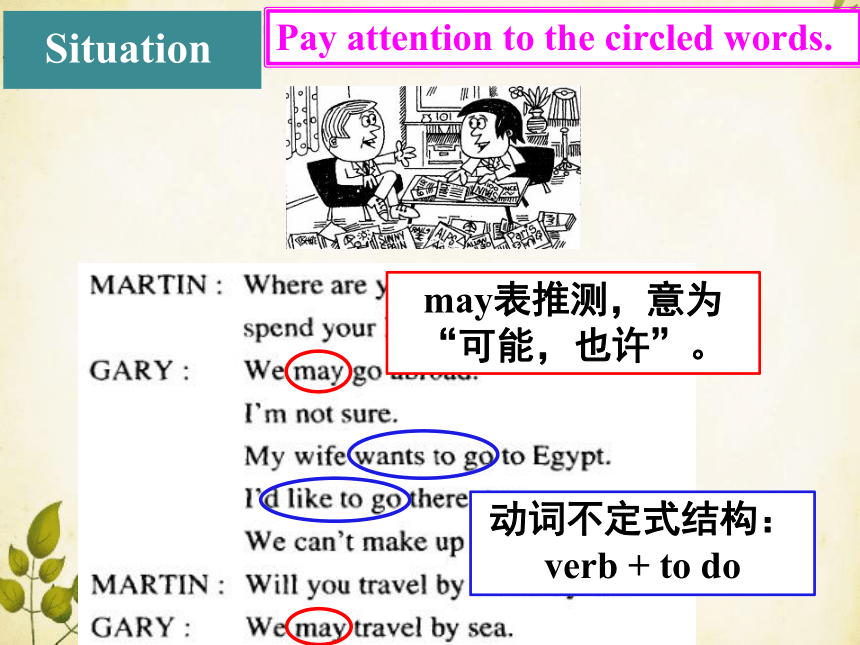
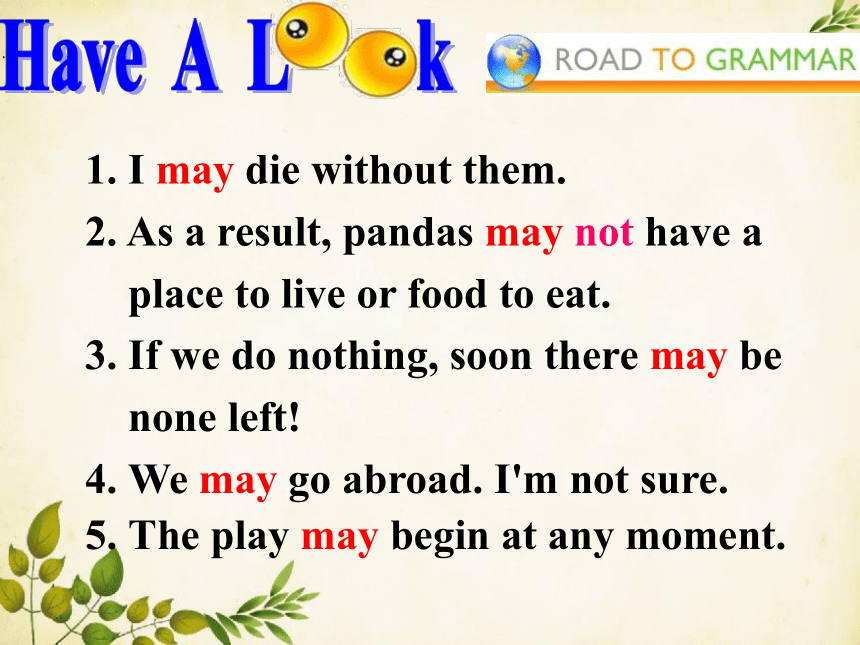
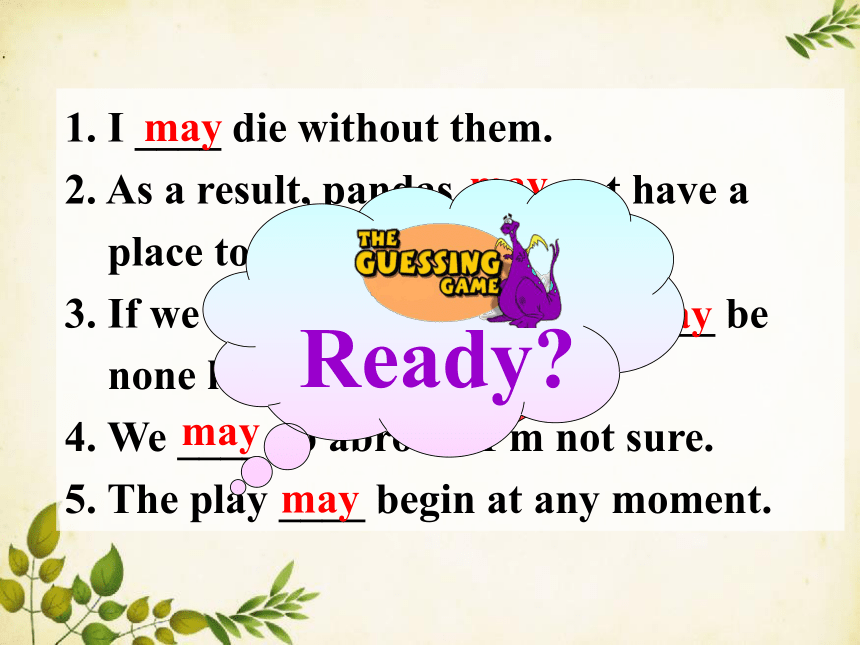

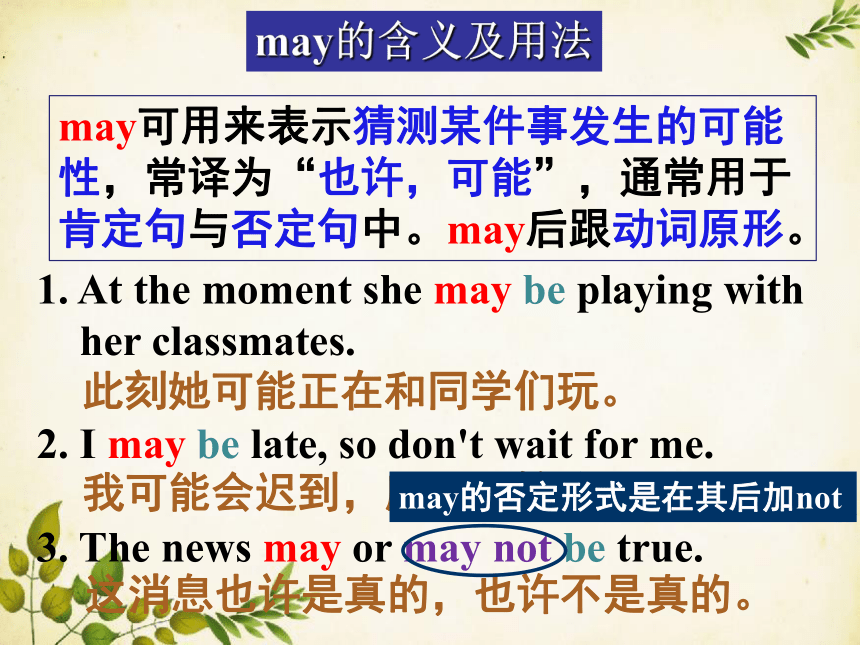

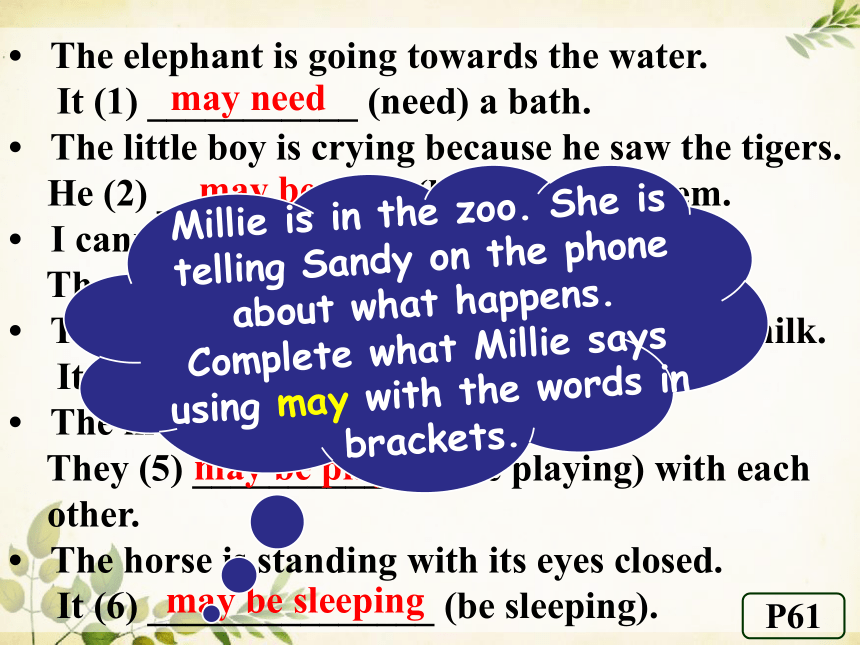
文档简介
(共32张PPT)
closed
bat
bee
lost
get lost
the same …as
save
adj. 关闭的
n. 蝙蝠
n. 蜜蜂
adj. 迷路的,迷失的
迷路
与……同样
vt. & vi. 储存,节省
Unit 5 Wild animals
Grammar
Situation
Pay attention to the circled words.
may表推测,意为“可能,也许”。
动词不定式结构:
verb + to do
1. I may die without them.
2. As a result, pandas may not have a
place to live or food to eat.
3. If we do nothing, soon there may be
none left!
4. We may go abroad. I'm not sure.
5. The play may begin at any moment.
1. I ____ die without them.
2. As a result, pandas ____ not have a
place to live or food to eat.
3. If we do nothing, soon there ____ be
none left!
4. We ____ go abroad. I'm not sure.
5. The play ____ begin at any moment.
go
may
may
may
may
may
Ready
Using may
for possibility
Focus on
用法
We use may to say that something is possible.
may的含义及用法
1. At the moment she may be playing with
her classmates.
2. I may be late, so don't wait for me.
3. The news may or may not be true.
这消息也许是真的,也许不是真的。
此刻她可能正在和同学们玩。
我可能会迟到,所以别等我。
may可用来表示猜测某件事发生的可能性,常译为“也许,可能”,通常用于肯定句与否定句中。may后跟动词原形。
may的否定形式是在其后加not
may可用于一般疑问句中,表示请求,常译为“可以”。在回答may开头的一般疑问句时,肯定回答用may,否定回答用mustn't。
- May I come in
- Yes, you may. / No, you mustn't.
—我可以进来吗?
—是的,你可以。/ 不,不可以。
Attention
The elephant is going towards the water.
It (1) ___________ (need) a bath.
The little boy is crying because he saw the tigers.
He (2) _____________ (be) afraid of them.
I cannot go near the lions and tigers.
They (3) ____________(hurt) me.
The baby panda is not drinking its mum's milk.
It (4) _____________ (not be) hungry.
The monkeys are jumping around.
They (5) _____________ (be playing) with each
other.
The horse is standing with its eyes closed.
It (6) _______________ (be sleeping).
may need
may be
may hurt
may not be
may be playing
may be sleeping
Millie is in the zoo. She is telling Sandy on the phone about what happens.
Complete what Millie says using may with the words in brackets.
P61
Using verbs + to-infinitives
Focus on
用法
1. At four months old, she weighed about eight kilograms
and started to go outside for the first time.
2. When she was six months old, she began to eat bamboo.
3. When she was 20 months old, she learnt to look after
herself.
4. Li Hua wants to play in the next World Cup. (七年级上
册 U2)
5. I plan to eat more fruit and vegetables every day. (七年
级上册 U6)
6. After dinner, we like to watch TV and chat there. (七年
级下册 U1)
7. I love to sit there and look out at the beach and the sea.
(七级下册 U1)
8. I want to help sick people. (七年级下册 U1)
9. I started to play the violin at the age of six. (七年级下册
U7)
当两个动词连用时,主要行为动词后面的动词采用
“____________”的结构,这种结构称为动词不定式。
to+动词原形
1. At four months old, she weighed about
eight kilograms and start ______ (go)
outside for the first time.
2. When she was six months old, she began
______ (eat) bamboo.
3. When she was 20 months old, she learnt
____________ (look after) herself.
4. Li Hua wants _______ (play) in the next
next World Cup.
to play
to go
to eat
to look after
go
Ready
5. I plan ______ (eat) more fruit and
vegetables every day.
6. After dinner, we like __________________
(watch TV and chat) there.
7. I love _____ (sit) there and look out at the
beach and the sea.
8. I want _______ (help) sick people.
9. I started ________ (play) the violin at the
age of six.
to eat
to watch TV and chat
to sit
to help
to play
他争取开会不迟到。
1) My sister wants to be a teacher.
2) We should learn to deal with these problems.
3) Tina has decided to sell her car.
4) He tried not to be late for the meeting.
* 动词不定式常在动词后作宾语。
* 这类动词有 agree, begin, decide, fail, forget, hope, learn, plan, prepare, remember, try, want等。这类动词均属于及物动词,表明想要、计划或希望要做(或发生)的事。
动词不定式的用法
我的妹妹想当一名教师。
我们应该学会处理这些问题。
缇娜已经决定了要卖掉她的车。
动词不定式的否定形式为“not to+动词原形”
注意:动词不定式在句中不作谓语,因此没有人称和数的变化。
Dad: Do you know anything special about wild animals
Amy: Yes, Dad. For example, dolphins are clever.
They can (1) _________________ (learn, work out)
easy maths problems.
Dad: What do you know about bats
Amy: Bats can't see. but they can (2) ____________
(decide, fly) the right way with the help of their
mouth and ears.
Dad: Did you know that bees never get lost
Amy: Yes. Bees always (3) _____________________
(remember, come back) the same way as they went.
went.
Dad: What do you know about squirrels
Amy: They always (4) _____________ (begin, save) some
food before winter comes.
Dad: Yes, but sometimes they forget where to find
the food.
P62
learn to work out
decide to fly
remember to come back
begin to save
Amy's dad is asking Amy some questions about plete their
conversation with the words in brackets.
Review
1. may可用来表示猜测某件事发生
的可能性,常译为“也许,可能”。
2. 当两个动词连用时,主要行为动
词后面的动词采用“to+动词原形”
的结构,这种结构称为动词不定
式。
I. 用所给动词的适当形式填空。
1. Please remember ___________ (send)
the letter for me.
2. We decided ___________ (not go) out
because of the bad weather.
3. What do you want _________ (be) when
you grow up
4. I plan __________ (watch) Days of Our
Past.
to send
not to go
to be
to watch
II. 汉译英。
1. 格林先生或许在图书馆。(may)
_________________________________
2. 我们明天可能去野餐。(may)
_________________________________
3. 李红决定独立解出这道数学题。
_________________________________
_________________________________
4. 我刚才放那个风筝失败了。
_________________________________
Mr Green may be in the library.
We may go for a picnic tomorrow.
Li Hong decided to work out the maths
problem on her own.
I failed to fly the kite just now.
Self-evaluation
1. Can you use may for possibility
2. Can you use verbs + to-infinitives
correctly
各个击破
1. Finish the exercises in Learning
English.
2. Preview Integrated skills.
Homework
closed
bat
bee
lost
get lost
the same …as
save
adj. 关闭的
n. 蝙蝠
n. 蜜蜂
adj. 迷路的,迷失的
迷路
与……同样
vt. & vi. 储存,节省
Unit 5 Wild animals
Grammar
Situation
Pay attention to the circled words.
may表推测,意为“可能,也许”。
动词不定式结构:
verb + to do
1. I may die without them.
2. As a result, pandas may not have a
place to live or food to eat.
3. If we do nothing, soon there may be
none left!
4. We may go abroad. I'm not sure.
5. The play may begin at any moment.
1. I ____ die without them.
2. As a result, pandas ____ not have a
place to live or food to eat.
3. If we do nothing, soon there ____ be
none left!
4. We ____ go abroad. I'm not sure.
5. The play ____ begin at any moment.
go
may
may
may
may
may
Ready
Using may
for possibility
Focus on
用法
We use may to say that something is possible.
may的含义及用法
1. At the moment she may be playing with
her classmates.
2. I may be late, so don't wait for me.
3. The news may or may not be true.
这消息也许是真的,也许不是真的。
此刻她可能正在和同学们玩。
我可能会迟到,所以别等我。
may可用来表示猜测某件事发生的可能性,常译为“也许,可能”,通常用于肯定句与否定句中。may后跟动词原形。
may的否定形式是在其后加not
may可用于一般疑问句中,表示请求,常译为“可以”。在回答may开头的一般疑问句时,肯定回答用may,否定回答用mustn't。
- May I come in
- Yes, you may. / No, you mustn't.
—我可以进来吗?
—是的,你可以。/ 不,不可以。
Attention
The elephant is going towards the water.
It (1) ___________ (need) a bath.
The little boy is crying because he saw the tigers.
He (2) _____________ (be) afraid of them.
I cannot go near the lions and tigers.
They (3) ____________(hurt) me.
The baby panda is not drinking its mum's milk.
It (4) _____________ (not be) hungry.
The monkeys are jumping around.
They (5) _____________ (be playing) with each
other.
The horse is standing with its eyes closed.
It (6) _______________ (be sleeping).
may need
may be
may hurt
may not be
may be playing
may be sleeping
Millie is in the zoo. She is telling Sandy on the phone about what happens.
Complete what Millie says using may with the words in brackets.
P61
Using verbs + to-infinitives
Focus on
用法
1. At four months old, she weighed about eight kilograms
and started to go outside for the first time.
2. When she was six months old, she began to eat bamboo.
3. When she was 20 months old, she learnt to look after
herself.
4. Li Hua wants to play in the next World Cup. (七年级上
册 U2)
5. I plan to eat more fruit and vegetables every day. (七年
级上册 U6)
6. After dinner, we like to watch TV and chat there. (七年
级下册 U1)
7. I love to sit there and look out at the beach and the sea.
(七级下册 U1)
8. I want to help sick people. (七年级下册 U1)
9. I started to play the violin at the age of six. (七年级下册
U7)
当两个动词连用时,主要行为动词后面的动词采用
“____________”的结构,这种结构称为动词不定式。
to+动词原形
1. At four months old, she weighed about
eight kilograms and start ______ (go)
outside for the first time.
2. When she was six months old, she began
______ (eat) bamboo.
3. When she was 20 months old, she learnt
____________ (look after) herself.
4. Li Hua wants _______ (play) in the next
next World Cup.
to play
to go
to eat
to look after
go
Ready
5. I plan ______ (eat) more fruit and
vegetables every day.
6. After dinner, we like __________________
(watch TV and chat) there.
7. I love _____ (sit) there and look out at the
beach and the sea.
8. I want _______ (help) sick people.
9. I started ________ (play) the violin at the
age of six.
to eat
to watch TV and chat
to sit
to help
to play
他争取开会不迟到。
1) My sister wants to be a teacher.
2) We should learn to deal with these problems.
3) Tina has decided to sell her car.
4) He tried not to be late for the meeting.
* 动词不定式常在动词后作宾语。
* 这类动词有 agree, begin, decide, fail, forget, hope, learn, plan, prepare, remember, try, want等。这类动词均属于及物动词,表明想要、计划或希望要做(或发生)的事。
动词不定式的用法
我的妹妹想当一名教师。
我们应该学会处理这些问题。
缇娜已经决定了要卖掉她的车。
动词不定式的否定形式为“not to+动词原形”
注意:动词不定式在句中不作谓语,因此没有人称和数的变化。
Dad: Do you know anything special about wild animals
Amy: Yes, Dad. For example, dolphins are clever.
They can (1) _________________ (learn, work out)
easy maths problems.
Dad: What do you know about bats
Amy: Bats can't see. but they can (2) ____________
(decide, fly) the right way with the help of their
mouth and ears.
Dad: Did you know that bees never get lost
Amy: Yes. Bees always (3) _____________________
(remember, come back) the same way as they went.
went.
Dad: What do you know about squirrels
Amy: They always (4) _____________ (begin, save) some
food before winter comes.
Dad: Yes, but sometimes they forget where to find
the food.
P62
learn to work out
decide to fly
remember to come back
begin to save
Amy's dad is asking Amy some questions about plete their
conversation with the words in brackets.
Review
1. may可用来表示猜测某件事发生
的可能性,常译为“也许,可能”。
2. 当两个动词连用时,主要行为动
词后面的动词采用“to+动词原形”
的结构,这种结构称为动词不定
式。
I. 用所给动词的适当形式填空。
1. Please remember ___________ (send)
the letter for me.
2. We decided ___________ (not go) out
because of the bad weather.
3. What do you want _________ (be) when
you grow up
4. I plan __________ (watch) Days of Our
Past.
to send
not to go
to be
to watch
II. 汉译英。
1. 格林先生或许在图书馆。(may)
_________________________________
2. 我们明天可能去野餐。(may)
_________________________________
3. 李红决定独立解出这道数学题。
_________________________________
_________________________________
4. 我刚才放那个风筝失败了。
_________________________________
Mr Green may be in the library.
We may go for a picnic tomorrow.
Li Hong decided to work out the maths
problem on her own.
I failed to fly the kite just now.
Self-evaluation
1. Can you use may for possibility
2. Can you use verbs + to-infinitives
correctly
各个击破
1. Finish the exercises in Learning
English.
2. Preview Integrated skills.
Homework
